Federal Judge Strikes Down North Dakota’s Voter ID Law
A Federal Judge in North Dakota has struck down that state's Voter ID Law, the fourth such decision in less than a month.
A Federal District Court Judge in North Dakota has struck down that state’s Voter ID law on the ground that it unfairly discriminates against the state’s Native American population, joining a series of decisions over the past month that suggest we’ve hit a turning point in the Voter ID debate:
A federal judge on Monday called North Dakota’s strict voter-ID law unfair to Native Americans and blocked its use in the coming election, continuing a series of recent victories against restrictions imposed by state legislatures.
In recent days, judges have blocked or loosened voting restrictions in Texas, North Carolina, Wisconsin and Kansas. The fights have pitted Democrats and civil rights groups who say restrictive ID laws discriminate against minorities against Republican legislators, who say they enacted the laws to combat voter fraud and protect the public’s confidence in elections.
U.S. District Judge Daniel L. Hovland said North Dakota for years had provided a safety net for those unable to provide the specific kinds of ID required, and that eliminating it in 2013 would mean eligible voters are disenfranchised.
Before 2013, the state allowed many forms of identification for use at the polls, and those without could sign affidavits to their identity. But the 2013 law allowed only four forms of ID: a North Dakota driver’s license; a North Dakota non-driver’s ID card; a tribal government-issued ID card; or an alternative form of ID prescribed by the secretary of state.
A provision added last year prohibited the secretary of state from allowing college IDs or military IDs to be used.
“Although the majority of voters in North Dakota either possess a qualifying voter ID or can easily obtain one, it is clear that a safety net is needed for those voters who simply cannot obtain a qualifying voter ID with reasonable effort,” Hovland wrote.
“Voter fraud in North Dakota has been virtually non-existent,” wrote Hovland, who was nominated to the bench in 2002 by President George W. Bush. He said the state “produced no evidence suggesting the public’s confidence in the electoral process would be undermined by excusing those voters who cannot reasonably obtain an ID.”
The burdens fall particularly hard on the state’s Native American population, Hovland said
“The undisputed evidence before the court reveals that Native Americans face substantial and disproportionate burdens in obtaining each form of ID deemed acceptable under the new law,” he wrote.
He added that the law’s challengers “presented undisputed evidence that more than 3,800 Native Americans may likely be denied the right to vote in the upcoming general election in November 2016 absent injunctive relief.”
“Although the majority of voters in North Dakota either possess a qualifying voter ID or can easily obtain one, it is clear that a safety net is needed for those voters who simply cannot obtain a qualifying voter ID with reasonable effort,” Hovland wrote.
The lawsuit was brought by several Native Americans, who presented evidence that the group is less likely to have driver’s licenses, lack birth certificates that are required in some cases to get an ID and are uniquely unable to make use of alternatives such as providing two documents that show their residential addresses.
“One reason is that many Native Americans do not have residential addresses, and the Post Office delivers their mail to a post office box,” the judge wrote.
The decision on Monday marks the fourth state in a month that has seen their Voter ID law struck down by a Federal Court. The chain of decisions started with a ruling by a panel of the Fifth Circuit Court of Appeals striking down that struck down Texas’s Voter ID Law on the ground that it unfairly discriminated against African-Americans and other minority groups in the state. Most recently, Federal Judges have struck down Voter ID Laws in North Carolina and Wisconsin on similar grounds. In the Kansas case mentioned above, a state-level Judge has ruled that the state must count what could amount to thousands of votes in state and local elections comprising the votes of people who registered to vote without being able to produce documentation proving their citizenship in compliance with a state law that requires such documentation to vote in state and local elections (the restriction cannot apply in Federal elections because it is more restrictive than Federal Motor Voter regulations). In all of the Federal cases, the common theme running through the decisions has been the fact that, although the laws in question differ, they each violate either the Constitution or the Voting Rights Act because of the fact that they make it difficult for poor and minority voters to either obtain the documentation necessary to get a Voter ID, or because they make it difficult for members of those groups to obtain the Voter ID at all.
The fact that these rulings are coming out together is hard to ignore, of course, and Ian Millhiser argues that it’s a sign that the tide has turned in the battle over Voter ID Laws:
[T[he judicial landscape facing voting rights advocates is massively more favorable than the landscape they faced in the 2014 election, when conservatives still controlled a majority on the Supreme Court. If Justice Antonin Scalia were still alive today, North Carolina advocates in particular would be biting their nails fearing that their state’s anti-voter law would soon be reinstated. Without a conservative Supreme Court majority, by contrast, the appeals court’s decision striking much of the North Carolina law is all but certain to be the final word — at least until after the election.
Take Crawford v. Marion County Election Board, a 2008 decision turning away a challenge to Indiana’s voter ID law. Voter ID laws ostensibly prevent voter fraud at the polls, but numerous studies andinvestigations — including investigations led by elected officials who support voter ID — have shown that such fraud barely exists. Indeed, the most striking thing about Crawford is that the Court’s lead opinion is only able to cite a single instance of in-person voter fraud within the previous 140 years!
Nevertheless, that opinion also treated the arguments of voting rights advocates warning of disenfranchisement and the arguments of lawmakers complaining of a kind of fraud that basically does not exist as if they had equal weight. “On the basis of the evidence in the record,” the opinion claimed, “it is not possible to quantify either the magnitude of the burden on this narrow class of voters or the portion of the burden imposed on them that is fully justified.”
Whatever the wisdom of this decision at the time, two things are worth noting about it eight years later. The first is that retired Justice John Paul Stevens, the author of the lead opinion in Crawford, has since labeled that case a “fairly unfortunate decision.” Stevens says that he learned “a lot of things outside the record that made me very concerned about” voter ID, but that he felt that he “had a duty to confine myself to what the record did prove, and I thought it did not prove the plaintiffs’ case.”
(…)
The second point that is worth noting about Crawford is that, however imperfect the record might have been in 2008, there is now no longer any reasonable doubt that voter ID laws exist to prevent certain people from voting and not to protect election integrity. As explained above, the kind of fraud these laws supposedly prevent is only slightly more common than unicorns. Meanwhile, research into the real impact of such laws shows that their primary effect is to prevent voters who tend to prefer Democrats to Republicans from casting a ballot. One study determined that “Democratic turnout drops by an estimated 8.8 percentage points in general elections when strict photo identification laws are in place,” compared to 3.6 percentage points for Republicans. Other, more conservative estimates still indicate that voter ID can add more than a full percentage pointto the GOP’s margin over Democrats.
Even more significantly, given the current state of the law, voter ID laws disproportionately impact voters of color — much like other common tactics used by conservative lawmakers often target minority voters, including tactics such as cuts to early voting or efforts to make it harder to register to vote.
This disproportionate impact on voters of color matters because the Voting Rights Act, which was not at issue in Crawford, prohibits any “voting qualification or prerequisite to voting or standard, practice, or procedure . . . which results in a denial or abridgement of the right of any citizen . . . to vote on account of race or color.” So voting rights advocates do not need to overrule Crawford, an outcome that is unlikely at least as long as the Supreme Court is evenly divided between liberals and conservatives, in order to convince judges to strike down many modern voter suppression laws.
In addition to the disproportionate impact of these laws on minorities and the poor, of course, is the fact that numerous studies have revealed little evidence of the kind of in-person voter fraud and impersonation that Voter ID Laws are designed to prevent, and little evidence that there was an epidemic of any such voter fraud prior to the adoption of these laws in any of the states in which they have been implemented. That alone doesn’t invalidate the laws, of course, but when viewed in combination with the disproportionate impact of the laws in question it does put into doubt the assertion of the states that have had their laws challenged regarding the primary motivation of the speed with which they have sought to implement these changes into law. As I’ve said before, what is apparent though is that these laws are primarily aimed at giving advantages to one political party over another. However, since the primarily Republican legislatures that have passed these laws in recent years have been aiming at Democrats, it’s somewhat inevitable that the laws in question would end up having a significant impact on the minority voters that make up a large part of Democratic voting blocs in many states. Additionally, the fact that, in many cases, the legislature has been reluctant to address what seem like legitimate complaints about the laws, including the cost of obtaining identification and the difficulties that some groups encounter in gathering the necessary documents and getting to the proper offices to get identification, has also raised questions about the true motivation behind these laws.
As I have said before, there is nothing per se wrong with Voter ID Laws or the idea that people should be required to provide some proof that they are who they say they are when they cast a ballot, there also needs to be some accommodation for the difficulties that some groups encounter in obtaining the an identification card that would allow them to exercise their right to vote. The primary accommodation, of course, should be that voters should not have to pay any fees associated with obtaining the identification in question. This should include not only no fee for the identification, but also no fee for obtaining copies of underlying supporting documentation in the form of government documentation such as birth certificates or other records that might be needed to prove citizenship. This may be easier said than done, but it strikes me as the only fair way to implement such a law. Finally, some provision should be made in the law for those people who quite simply cannot obtain an identification because they can’t obtain the appropriate underlying supporting documents. Granted, such cases are likely to be rare but for older Americans they apparently as uncommon as you might think. If those issues can be dealt with fairly, then the law would seem to me to be entirely acceptable. How necessary it actually is is, of course, another question.
Here’s the opinion in the North Dakota case:
Brakebill Et Al v. Jaeger by Doug Mataconis on Scribd
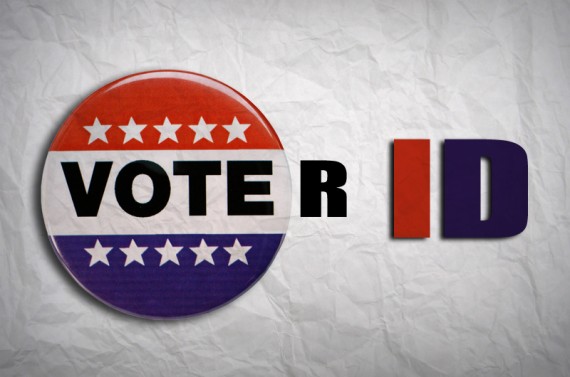

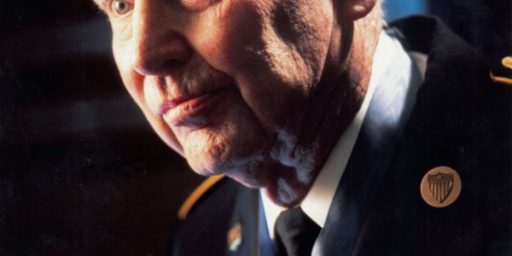
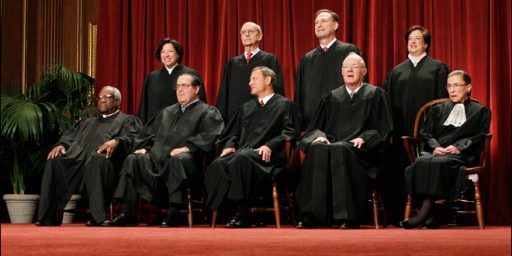
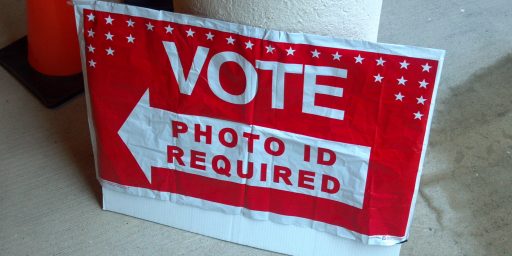
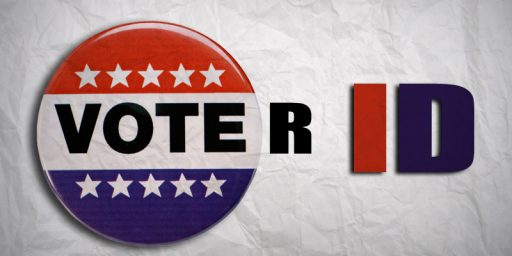
Agreed. Indeed, such a law would have additional benefits since the lack of ID and the lack of ability to get an ID can have other impacts as well, including difficulty with employment. If the GOP propose a wholesale overhaul of the ID system, they’d find a lot of support.
@Hal_10000:
But that would defeat the entire purpose of the law.
Wow. The vast left wing conspiracy devoted to rigging the upcoming election is showing how efficient and complete it’s takeover of the federal judiciary is. THIS INJUSTICE MUST NOT STAND! They are stealing our elections thru their concerted efforts to let the poor, the landless, the blahs and the spics and the slants, not to mention the wimmens, vote.
TAKE BACK YOUR COUNTRY!!!
(if the Koch brothers are willing to sell that is)
Yeah, these were always laws with a thinly veiled purpose in mind. A lot like the admitting privileges laws for abortion providers. You can say what you want about why you’re pursuing this legislation. But, you can’t get me to take you seriously.
Creating the difficulties is the point of the law, Doug. That’s the point.
From the 4th circuit decision in the NC case:
The proper time for determining eligibility is during the registration process, not when someone shows up at the polling place.
If one votes in person, at least in California, one signs one’s name on a list of all registered voters in the precinct. I’ve yet to hear of more than one person trying to vote using the same name & address.
Though it’s still kind of mind-blowing how many responses all over the internet to this story boil down to “I’m a healthy middle class white person with disposable income, a somewhat flexible job (or no job), convenient government offices, effortless travel ability, and have never been targeted by the legislature, and I simply don’t understand what’s so hard about getting a driver’s license!”
I would support a voter ID law of a different kind: A proposal to make voting more difficult would have to identify a series of cogent, defensible and statistically sound justifications for changing the law.
By requiring legislation to be reality-based, vague, unsubstantiated fears of voter fraud that play to the petty concerns of talk-show-addicted high school dropouts wouldn’t cut it. It would have to be clearly demonstrated that the benefit gained from the restriction greatly exceeded the harm that is inflicted when some eligible citizens are excluded. Since voting is a right, we should take seriously any efforts to exclude citizens from exercising that right.
@Hal_10000: They would not. The NRA and gun owners would oppose it. A national ID number and national ID cards are different things, but, even so.
@Pch101:
Unless they are black. Or Hispanic. Or Asian. Or Muslim. Or Hindu. Or Jewish. Or Voodoo. Or poor. Or Landless. Or female. Or… Or…. Or…. anybody we don’t want to vote
@Hal_10000:
Yeah. I am sure the nice people who think that federal ID is the mark of the beast will get to work on that!
@humanoid.panda: Interestingly enough, when Dubya suggested a national ID number (in the form of a tattoo even, IIRC) as a response to keeping terrorists at bay, those nice people that you refer too acknowledged that there were some people who might associate such a number with “the mark of the Beast,” but had no objection to THIS proposal because it related to national security.
It seems to depend on who proposes it…
@Just ‘nutha ig’rant cracker: Wait what? W proposed to tattoo a national id number on people? Do you happen to have a link for that?
“Vote early and often”
“Voting in the morning, voting in the evening, voting at supper
time”
our dumb country, these judges think so less of those they rule over that they can’t demand a shred of responsibility. i mean really, there’s not even the proverbial “poor old black woman living in the woods” to trot out for this one.
ironically most countries require an id to vote- even nelson mandela encouraged his flock to get an id……but hey, they must really appreciate their version of democracy.
@bill: See @steve s: above.
What a concerted effort by all the recent rulings….as democrats motto goes vote early and vote often!
@Hector: Out of curiosity, how do you square your comment with the judge’s factual statement that, “Voter fraud in North Dakota has been virtually non-existent”?
@Hector: Oh, yes, those deep deep blue states, Texas, North Dakota, and Kansas – those rascaly Democrats are at it again!
*eyeroll*
@Hector: I don’t get that slogan “vote early and vote often”. I voted in Illinois for over two decades and I never once had an experience where I thought “gee I could vote again if I wanted”. I can’t help but question if you have even voted in a federal election..
The logistics required to commit voter fraud on a scale that would actually impact the election is massive. It’d be much easier to manipulate the machines and the people doing the counting.
I wonder where this will finish up. Are any and all voting requirements going to be out ? Will any id requirements be allowed ?
I am certainly opposed to any sort of rules that are designed toward keeping a class or group of people out.
Now they are talking about lowering the voting age to 16. That is a topic for another day.
I wonder what Jefferson would say.
@bill:
I never thought that I’d see the day when a right-winger took a stand against American exceptionalism.
It would seem that denying the right to vote is even more important to you than placing the US at the center of the universe.
@bill:
Most countries also have subsidized child care, guaranteed paid vacations, and gun control. And yet somehow we’re only supposed to look at most other countries when it comes to ID requirements, not any of those other things.
@Tyrell:
About voting restrictions? He was in favor of them, certainly. Do you own or rent? If the latter, no vote for you. (I’m already assuming you’re a white male.)
What would Elizabeth I say about drone warfare? What would Socrates say about Snapchat? Who cares?
As it turns out, I hold a second citizenship in another country that does require an ID for voting.
The difference is that this other country doesn’t have a long tradition of using voting regulations and poll taxes as tools for preventing minorities from voting.
(The fact that the US has no tradition of requiring citizens to carry some sort of carte identite is also part of this; the notion of being forced to carry your papers clashes with American traditions.)
Some of us are suspicious whenever we see additional voting burdens in the US because we know where they come from and what they mean. When you have a lousy track record with voting rights as does the United States, then you have earned those doubts and suspicions. As the courts are finding out, those doubts and suspicions are more than justified.
@Catchling: I had a history teacher who talked a lot about:
If Britain won the Revolutionary War
If Booth missed
If Hitler had never been born
@Catchling:
Well, I am pretty sure René Descartes would love Snapchat. I think, therefore I selfie.
@Pch101: poor countries that just crawled out under oppressive rule are even smart enough to know the potential for voter fraud/rigged elections is high! especially after watching the dnc and their zany hijinx.
oh, i’m not a “right-winger”, more moderate than anything. although in here anyone who’s not bent to the left is considered one.
@Rafer Janders: we have subsidized child care- it’s called “public school”. and we do have gun control, yet many gun control countries have the highest murder rates. oh, paid vacations- you need a job to get them…..i don’t know any company that doesn’t offer that.
this is telling though;
“….it is clear that a safety net is needed for those voters who simply cannot obtain a qualifying voter ID with reasonable effort,”
how little effort must one make to get an id? i mean really, the act of registering to vote should be considered too much for some people and just another way to suppress the vote- by that measure.
@bill:
The story of voter fraud is basically a fraud. (Ironic, I know — you’ve been fooled by your precious GOP and its bogus talking points.)
Elections don’t get rigged with fake ballots — that is too difficult. One guy’s fake vote can’t do much of anything to change an election. (Take a statistics class, and this will be obvious.)
If you want to rig an election, then you find reasons to NOT count votes and to exclude the undesirables from voting. You would make sure that there aren’t enough voting booths in districts that lean against you so that voters are discouraged. You would find reasons to disqualify those who would probably vote against you so they simply don’t appear in the count. You would rig the voting machines so that they don’t quite work properly in precincts where you expect to lose.
Guys like you are useful idiots to the Republican leadership, and just idiots to the rest of us. Keep up the good work.
@bill:
AHAHAHAHAHA!!!! HAHAHAHAHAHAHAHAHA!!!!!!!
*wipes tears from eyes* Oh, man, that was a good one…..
@bill:
Which starts at ages five and up. So you just have to kind of wait it out for five years, and you’re good! Luckily, babies and toddlers don’t really require much in the way of supervision so don’t interfere with their parents going off to work and leaving them at home alone.
@Tyrell:
Most likely, he would enquire why are we letting domestic cattle to vote.
@Tyrell:
Most likely, he would enquire why are we letting domestic cattle to vote.
@Tyrell:
“Have a seat. I’ll have the slaves bring us something to eat, and we can talk about it.”